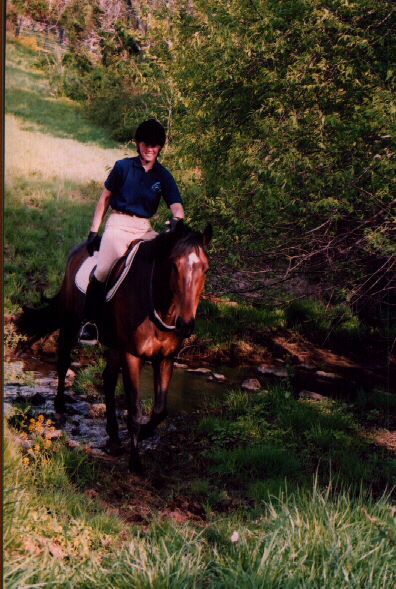Five Steps to a Calmer Horse

1. Go grain free. Many horses will maintain their weight on hay and grass and do not need the added calories and energy of grain. They will, however, need a vitamin/mineral supplement of some type and a salt block. If your horse cannot maintain his weight on hay and grass alone, choose a feed that is mostly fiber and fat rather than grain.
Many feed companies produce horse feeds that are lower in energy producing carbohydrates. Many horses do not need a lot of carbohydrates unless they are in hard work. These feeds are high in fiber which is what a horse's digestive system is best able to utilize. Beet pulp is often used as their base as it is a highly digestible fiber. Fat is added to help horses maintain their weight. Molasses is kept to a minimum as this can add too much energy.
2. Teach your horse to lower his head. (See "Calming Your Horse by Lowering His Head") This is the single most important way to teach your horse to be calm. Think about it. Have you ever seen a horse spaz out with his head low? Throwing the head up is part of the flight/fight reaction which sets up a chemical response in the body that prepares the horse to run or fight. This instinctive reaction blocks the horse's ability to think and learn well. It creates a great amount of tension in the body which often leads to what we see as resistances to training.
By teaching your horse to lower his head, beginning with a signal on his halter, and eventually progressing to work under saddle, you will be able to override his flight/fight reaction. He will learn an alternative to throwing his head up and reacting in an unthinking way. With his head low (just above the level of his withers) he will become calmer and able to learn more easily.
3. Check your horse's body for pain. (See "Exploration TTouch") If you have ever had a sore back, neck, hip or other body part, didn't you find that it made you a bit fidgety? It is hard to sit or stand still for long when you are in pain. And wasn't it hard to concentrate on something other than your pain?
A horse with a sore back will also be fidgety and have difficulty concentrating when ridden. He will tighten his back muscles which will raise his head, putting him close to the flight/fight reaction. He may buck. The tension in his body will tend to make him shy and spook as well. Dramatic changes often occur in a horse's behavior once pain is eliminated from his body.
4. Increase your horse's self confidence. During the course of training many people over face their horses by asking too much, then try to make the horse comply. Instead, try "chunking" down exercises into smaller parts that allow the horse to be easily successful, then build from there. Take a tip from those who teach horses to jump. A good trainer does not begin by setting up a three-foot jump and forcing the horse over it. A good trainer starts with a single pole on the ground and builds from there.
By presenting the horse with small steps that he can perform easily, his confidence in his ability to do as you ask will increase. This will, then, increase his willingness to try. If you avoid over facing him, which often scares horses, his trust in you will also increase and the bond between the two of you will become stronger.
5. Breathe. You are 50% of the relationship between you and your horse. If you are tense, nervous or unsure, your horse will mirror you. If you arrive at the barn in any state other than relaxed, your horse will notice. So, before you begin, take a few minutes to relax. Try this exercise:
Sit in a comfortable position with your feet flat on the floor. Place one hand on your lower abdomen just below your navel. Concentrate on your breathing. As you inhale, push your lower abdomen out, then allow it to flatten as you exhale. Allow your hand to ride along with this motion. Inhale through your nose and exhale through your mouth. Take slightly fuller breaths than normal. Now, close your eyes and count your breaths backwards starting with "50." When you are finished you will find that you are much more relaxed!

